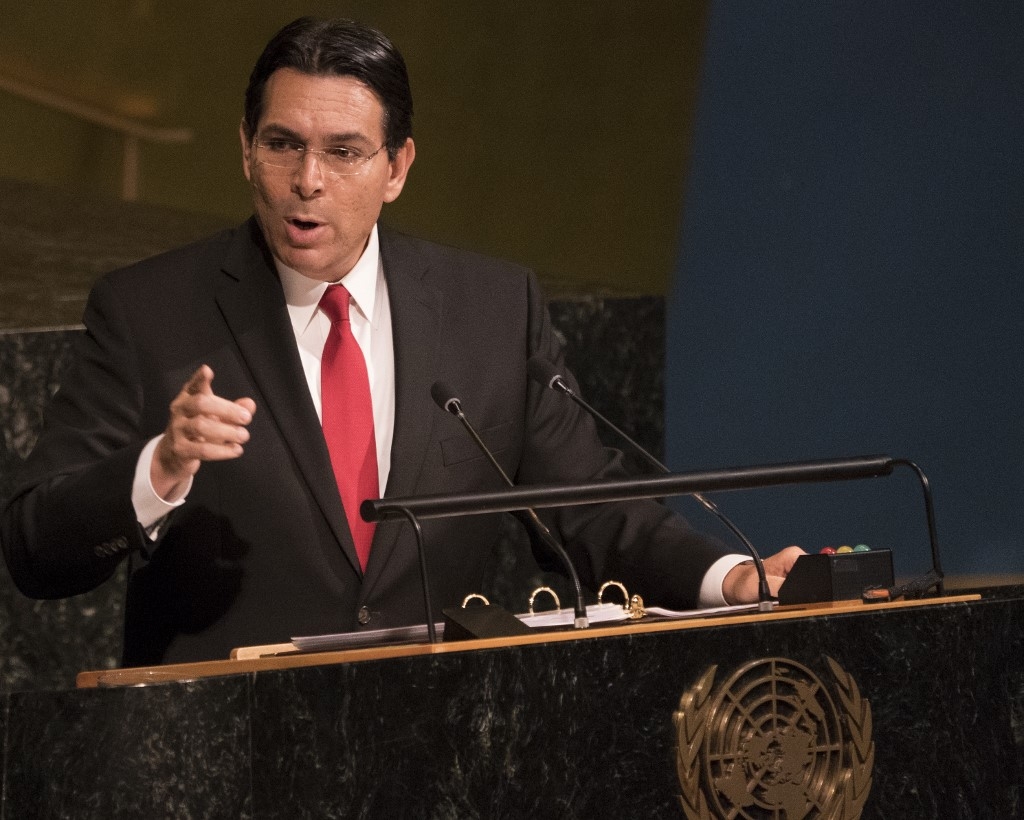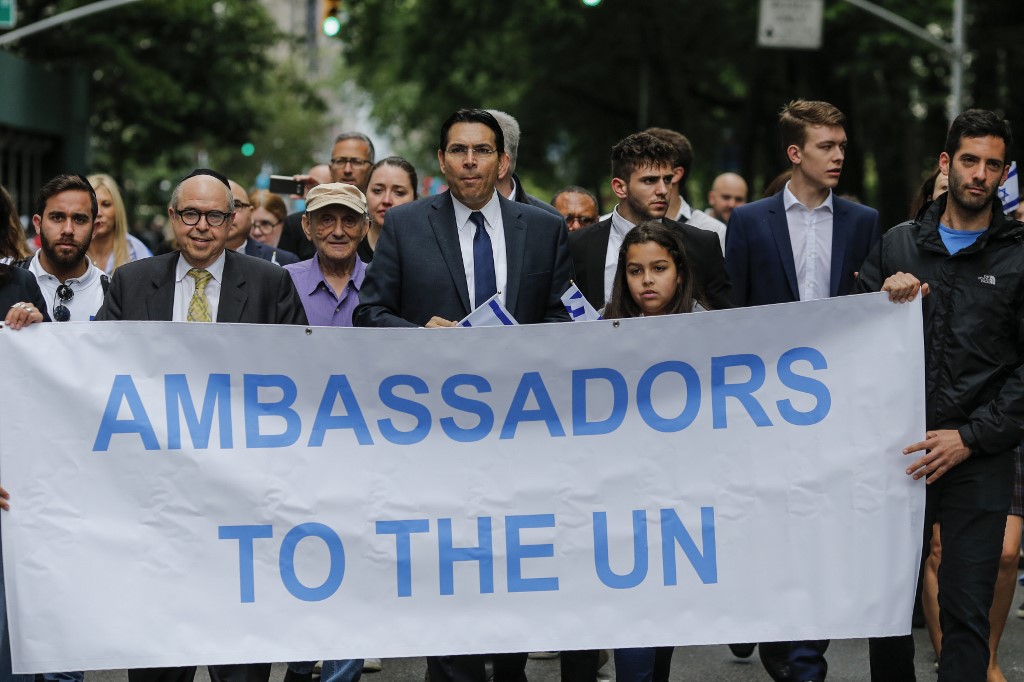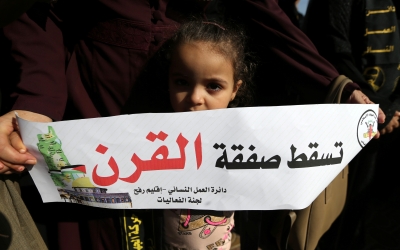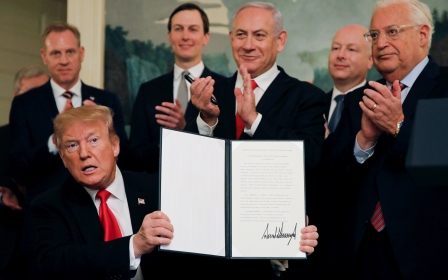Danny Danon: Israel's shameless PR man

At some point in his career, Danny Danon must have discovered that to defend the state of Israel, he would have to upend truth; call black, white; and when that failed, resort to outright falsehoods.
His first speech to the Security Council as Israel’s UN ambassador in October 2015 is a case in point.
“The UN must end its usual practice of calling on both sides to show restraint, and state clearly: there is one side that is instigating a wave of terror,” he declared. Without a blush, he went on to ask the council to stop making excuses for the perpetrators of terrorism, the Palestinians, and start making them accountable.
Effrontery on display
These should have been the words of a Palestinian, angry at the biased international discourse on the Israel-Palestine conflict, which constantly obscures the truth about Israel’s one-sided brutality with talk of “even-handedness”. That it was an Israeli Zionist who said them instead shows how far the inversion of truth has gone in Israel.
New MEE newsletter: Jerusalem Dispatch
Sign up to get the latest insights and analysis on Israel-Palestine, alongside Turkey Unpacked and other MEE newsletters
The same Danon effrontery was on display again in a New York Times article published on the eve of the “Peace to Prosperity” economic workshop last week in Bahrain. The workshop was billed as the first part of US President Donald Trump’s “deal of the century”, and was supposed to be the economic portion of Trump’s lasting solution to the Israel-Palestine conflict. Its basic premise is simple: Palestinians can be bribed into relinquishing their rights and accepting Israeli domination.
Danon's main point is that Palestinians should know when they're beaten, and give up the struggle for their rights
No doubt encouraged by the spectacle of a pro-Israel US conference being hosted by Arabs, whose purses will subsequently be raided to fund the deal, Danon’s take on this “new approach” was a series of patronising insults.
The only notable aspect of his piece - starting with its title, "What's wrong with Palestinian surrender?" - is that the Times dignified these wild allegations and disinformation by giving them a platform.
Danon’s main point is that Palestinians should know when they’re beaten, and give up the struggle for their rights - not that they have any, according to the litany of stock Zionist accusations he trots out. He blames the Palestinian leadership for preventing them from benefiting from Trump’s “new approach”. The Palestinian Authority is totally corrupt, he argues, and despite being “showered” with billions in aid by the international community, there is nothing to show for it.
Calling for Palestinian surrender
Hamas is a terrorist group, Danon argues, its tactics taken from al-Qaeda and Hezbollah. Palestinians have rejected multiple peace overtures, and incited hatred against Israel instead. They have launched “wars” on Israel and are sponsors of terror. It is UNRWA - the UN agency for Palestinian refugees that the US is trying to shut down - which is responsible for keeping refugees in camps.
But surrender is nothing to be ashamed of, Danon comforts Palestinians. He reminds them of US benevolence towards Germany and Japan after their surrender in World War Two - a historically illiterate comparison if ever there was one - or Egypt’s surrender after its defeat in the wars against Israel. Stealing Yasser Arafat’s line in his historic speech to the UN General Assembly in 1974, Danon exhorts the Palestinians to put down the sword and take up the olive branch.
Danon is among a breed of slick Israeli operatives whose primary function is to burnish Israel’s tarnished image through clever PR. His past positions on the Palestinians are uncompromising. In a 2011 New York Times article, he proposed annexing the West Bank settlements to Israel, and spreading Israeli sovereignty to most of the West Bank.
In the 2014 Israeli assault on Gaza, he advocated a shutdown of all gas and electricity supplies to force Hamas into a ceasefire. He does not believe in a two-state solution, and has declared that whoever supports peace with the Palestinians has no place in the Likud Party, to which he belongs. He also participated in a 2012 racist protest against African migrants.
Seat at the highest table
That such a man should support Trump’s anti-Palestinian deal is no mystery. What is truly incomprehensible is the indulgence he and his ilk enjoy in the corridors of power.
During his tenure at the UN, in 2016, Danon organised the first UN anti-boycott, divestment and sanctions event, at which he called out alleged anti-Israel activity at the global body.
At about the same time, he was elected chair of the UN Legal Committee, a first ever for Israel. This committee is concerned with UN activities on international law and the status of additional protocols of the Geneva Conventions.
It is a supreme irony that Israel, a serial violator of international law and the Geneva Conventions, should have been given such a position. “Israel is a world leader in international law and fighting terrorism,” Danon said at the time, adding it would share its “knowledge with the countries of the world”.
As a representative of Israel, Danon is respected and welcomed into the highest circles. Why Israel, an apartheid state that commits daily crimes against the Palestinian people with total impunity, should earn any respect from anyone is the real question here. Can it really all hinge on US support for the Jewish state?
The views expressed in this article belong to the author and do not necessarily reflect the editorial policy of Middle East Eye.
Middle East Eye delivers independent and unrivalled coverage and analysis of the Middle East, North Africa and beyond. To learn more about republishing this content and the associated fees, please fill out this form. More about MEE can be found here.







